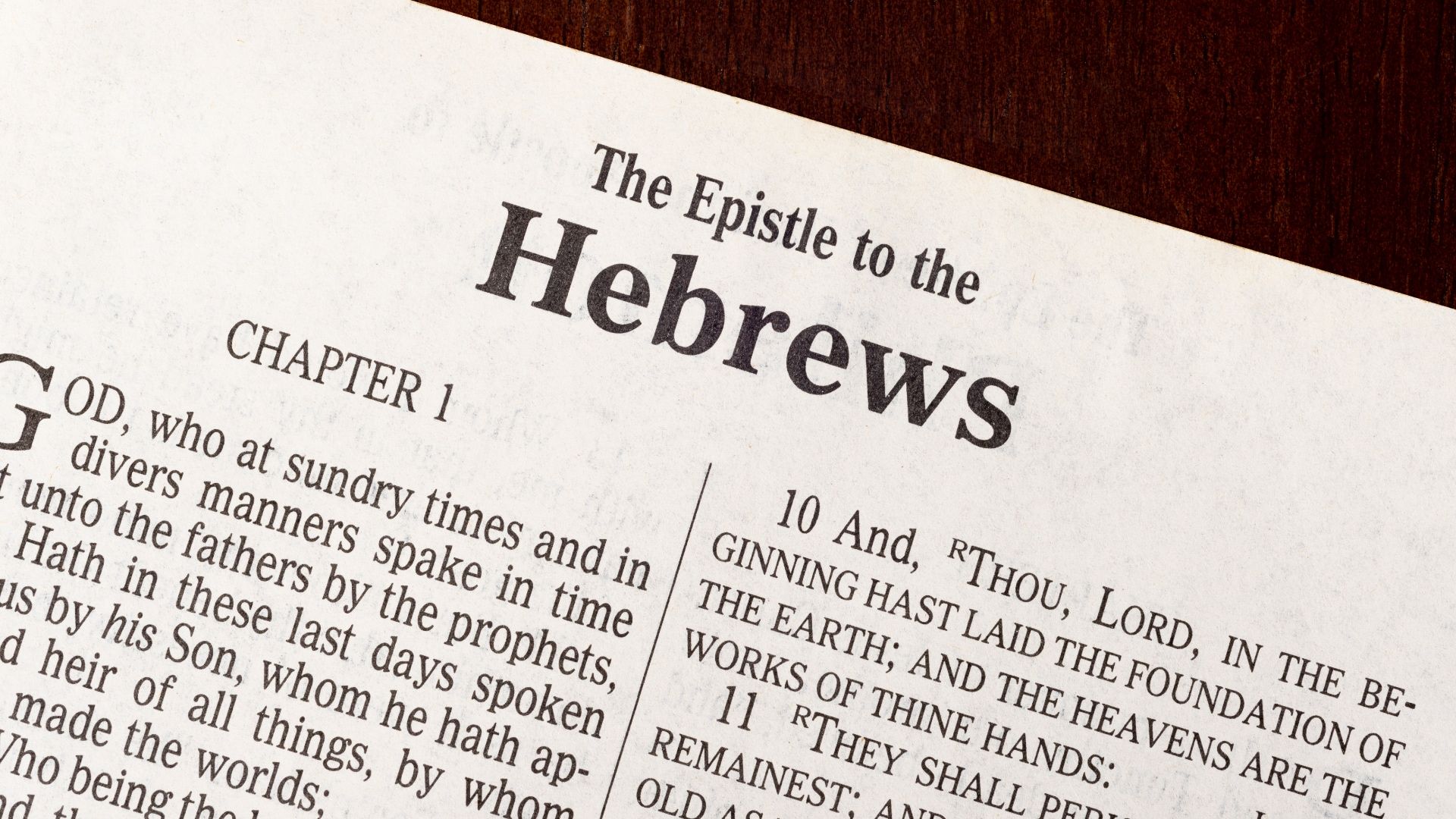Why Jesus Came and Suffered (Hebrews 2:5-18)

Big Idea: Jesus became one of us to do what we couldn’t do for ourselves.
Ten years ago, I had to store my library. If you know me, you know what a big deal that was. So my library went into boxes, and for ten years my books were stored in a basement where I couldn’t access them.
Two years ago, I found room to unpack my library. And so I pulled them out of storage and began to sort which ones I wanted to keep and which ones I wanted to shelve. I knew it was a big job. I figured it would take a day, so I gave myself two days just in case.
Five days later, I knew I was in trouble. Here’s what it looked like.
The problem is that the very next day we had to use that room for something else, so I had to call in help. I came to Char and Josiah, and all day Saturday we worked at it and got the job done. I made a mess and realized I needed help to fix it.
Have you ever been there? According to the passage we’re looking at today, we have all been there.
We’re looking right now at a letter written to a group of Christians a long time ago. The letter is called Hebrews. The writer has just spent a lot of time showing us how glorious Jesus is. But in today’s passage, he has another message for us, and it’s basically this: we’re in trouble. We need someone from outside of us to come in and turn things around.
The Problem: We’re in a Mess
Here’s the situation.
God had big plans for us. The writer of Hebrews has just been talking about angels, but then in verse 5 he says, “For it was not to angels that God subjected the world to come, of which we are speaking.” In other words, angels are a big deal. They’re greater than humans. But they’re not the ones to whom God has subjected the world to come.
To whom has God subjected the world to come? Humans! He goes on to quote the Hebrew Scriptures to talk about what God intended when we created humanity. The quote is found in Hebrews 2:6-8, and he’s quoting Psalm 8:
What is man, that you are mindful of him,
or the son of man, that you care for him?
You made him for a little while lower than the angels;
you have crowned him with glory and honor,
putting everything in subjection under his feet.
(Hebrews 2:6–8)
We have a decision to make in our interpretation here. Is Hebrews talking about Jesus or humanity when it quotes this psalm? There’s been a lot of debate back and forth on this, and it’s a complicated issues. Fortunately it doesn’t change the overall thrust of this argument. But he seems to make a contrast in verses 8 and 9 which leads me to believe he’s talking about humans in verse 8 and Jesus in verse 9.
Here’s what he’s saying: Who is this world — now and future — subject to? Unbelievably, us! This is unbelievable. This goes right back to Genesis 1. Even though we are very finite creatures who get cranky if we don’t get enough sleep and who need to groom ourselves so we don’t develop body odor, even though we are dirt creatures, God has given us an important role in this world. You were made in God’s image, and summoned to rule the world on God’s behalf, and that includes ruling over the angels. You have dignity and purpose.
Here’s the problem. We’ve made a mess of this responsibility. I don’t know if you’ve ever had that experience of being assigned work and knowing that you haven’t done a good job. Not only have we not done a good job, but we have completely and utterly failed. God put us here to manage and care for God’s creation, to bring out its glory and splendor. But we rebelled against him. The world is a mess. All you have to do is to open the news to see how badly we’ve bungled this. The reason is sin. Sin has damaged this world and our ability to play the role God designed us to play in this world.
That’s why verse 8 says, “Now in putting everything in subjection to him, he left nothing outside his control. At present, we do not yet see everything in subjection to him.” That’s an understatement. Creation was meant to be subject to humanity, but it’s not. It feels like things are out of control.
This is the tension we feel every day. This is the tension that the original audience felt as life was not really going their way at all. This is the tension we feel as we see the world spin out of control.
Human beings were destined to rule the entire world for God. Everything was supposed to be under the rule and dominion of human beings, but sin intervened to frustrate this rule. The subsequent argument will clarify that death (which is due to sin) thwarts human dominion over the world. The glory designed for human beings has not become a reality in human history. Instead, human history is littered with the wreckage of destruction and death—a world gone mad. (Thomas Schreiner)
This is the problem. God gave us a job to do, and we’ve made a mess of it. Our only hope is to get some help. And that’s just what God has provided.
God’s Solution: Jesus Became One of Us to Do What We Couldn’t Do for Ourselves
Verses 9 to 18 give us the solution, God’s solution. Jesus became one of us to do what we couldn’t do for ourselves. Look at verse 9:
But we see him who for a little while was made lower than the angels, namely Jesus, crowned with glory and honor because of the suffering of death, so that by the grace of God he might taste death for everyone.
Chapter 1 has been all about Jesus being greater than angels. Now the writer gives us an amazing insight: the One who is greater than angels temporarily was made lower than the angels. He’s not only talking about his incarnation — what we’re about to celebrate at Christmas — but about his suffering and death. The exalted Jesus that we’ve been talking about became one of us and suffered and died. This is mind-boggling and yet it’s true.
In other words, we were in trouble, so God sent help. The exalted one that we’ve been talking about these past couple of weeks joined us to give us the help that we desperately needed.
Look at verse 10: “For it was fitting that he, for whom and by whom all things exist” — the exalted one that we’ve been talking about in Hebrews 1 — “in bringing many sons to glory, should make the founder of their salvation perfect through suffering.” The part about being made perfect through suffering doesn’t mean that there was any deficiency in Jesus that needed to be corrected. It has the sense of completion: that Jesus completed the mission that the Father had given him. He became perfectly qualified and equipped to play the role that God had prepared for him.
I want you to notice that word founder in verse 10, where it calls Jesus the founder of our salvation. The word founder there means more than you might think. It has the idea of leader. It was used in one place in ancient Greek mythology of Hercules, a champion. That's why, as one pastor (Steve Mathewson) explains, some would like to translate this "the champion of our salvation," almost like a superhero, the Superman of our salvation.
Notice the contrast between Jesus and us. God gave us a role, and we failed. God gave Jesus a role, and he completed it. That makes him qualified. All humanity failed except for one: Jesus. He succeeded where we didn’t. That’s why Jesus came: to do what we couldn’t. Jesus became human to carry out an assignment from his Father.
To do this, he had to become one of us. Verse 11 says, “For he who sanctifies and those who are sanctified all have one source. That is why he is not ashamed to call them brothers…” And then he quotes two Old Testament texts (Psalm 22:22 and Isaiah 8:17-18) that speak of Jesus’s solidarity with us. He stands in our midst. He stands, as verse 12 says, in the midst of the congregation. Jesus came and entered our mess.
Jesus became human to do what humanity couldn’t do for itself. We failed, and so Jesus joined us as our leader to do what we couldn’t.
What exactly did Jesus do when he joined us? Three things.
One: He overcame death
Verse 9 says, “by the grace of God he might taste death for everyone…” Tasted doesn’t mean sipped. It’s a Hebrew term that means to taste fully. He gulped it. He drank it all the way down. Verses 14 and 15 say:
Since therefore the children share in flesh and blood, he himself likewise partook of the same things, that through death he might destroy the one who has the power of death, that is, the devil, and deliver all those who through fear of death were subject to lifelong slavery.
Only one person has gone toe-to-toe with death and won. Billions of people have died over thousands of years, but only one has died and come back to life. He’s defeated death and the one who has the power of death — the devil — so we no longer have to be afraid.
If you have trusted Jesus, you no longer have to fear death because Jesus has defeated death. You can approach your own death without fear because Jesus has defeated death on your behalf.
But that’s not all that Jesus has done.
Two: He dealt with God’s wrath
For surely it is not angels that he helps, but he helps the offspring of Abraham. Therefore he had to be made like his brothers in every respect, so that he might become a merciful and faithful high priest in the service of God, to make propitiation for the sins of the people. (Hebrews 2:16-17)
What else did Jesus do? He not only defeated death, but he made propitiation for our sins. What does propitiation mean? Because of our sin, we deserved God’s wrath. It was right for God to express his wrath against our sin and rebellion. “To obtain our salvation for us, God himself met the demands of his holiness in Christ, which, because of the oneness of the Trinity, means he met the demands of his holiness himself” (Kent Hughes). Jesus died in our place. As our high priest he offered the perfect sacrifice — himself — so that anyone who trusts Christ no longer faces God’s wrath, because Jesus faced it for us.
Jesus died to defeat the twin terrors of sin and death. But there’s one more thing.
Three: He’s able to help you when you’re tempted
“For because he himself has suffered when tempted, he is able to help those who are being tempted” (2:18).
Has anyone been tempted in the past 24 hours? Of course you have. Do you know who’s able to help you? Jesus. Why? Because he’s been tempted too. Jesus never experienced temptation before he became human. He was sinless, but he sure knew what it was like to be tempted. “He didn't give in to that temptation,” writes Steve Mathewson. “But everything that you and I are tempted to do wrong, Jesus was, too. Because he suffered when he was tempted, he knows what it's like. He's able to help those who are tempted.”
Jesus knows what we’re going through. He can help us. He understands. He can provide grace and mercy in our time of need.
Here’s what this passage is telling us. God gave humans a role to play in this world, but we failed, and this world is a mess. But God sent Jesus to do for us what we couldn’t do for ourselves. He became our leader. He overcame death, dealt with God’s wrath, and — present tense — is able to help us with our struggles.
Let me bring this home in two ways.
Have you thought what it means that Jesus was willing to enter our mess and help us? There’s a famous story in our family. I won’t mention any names to protect the guilty. The story involves my nephews and nieces — mostly nephews — climbing a tank in the States. Everything was okay until the police came. “Whose kids are these?” he asked. The adult in charge claimed to have nothing to do with them. That adult was unwilling to enter the mess.
We know that temptation, don’t we? It’s hard to run into the mess when one occurs. It’s much easier to run the way.
Praise God that this isn’t what Jesus did. Jesus saw the mess that we created through sin. We deserved nothing but God’s judgment. We had no right to expect anything but his wrath. But instead, Jesus willingly entered the mess for you and for me.
Jesus isn’t scared by your mess. He’s not turning away from you no matter how bad your life is or no matter how much you’ve rebelled against him. Jesus has never turned away anyone who came to him. Have you done this? You can do this today. Come to him. Don’t waste a minute. Jesus does not turn away from us. Jesus enters our mess.
But let me also apply this in one more way. Sometimes I think there is no way that God could understand my struggles. But this passage says: God the Son more than understands.
As Steve Mathewson says:
Was Jesus tempted to steal? I think he probably was tempted to steal from one of his father's clients in their carpentry business. Do you think he was tempted to cheat? I assume he was. Do you think Jesus was tempted to slander someone, to smear someone's reputation with his words? According to the writer of Hebrews, I think he was. Do you think Jesus was tempted sexually? I believe he was, according to what the writer says. He didn't sin. He didn't give in to that temptation. But everything that you and I are tempted to do wrong, Jesus was, too. Because he suffered when he was tempted, he knows what it's like. He's able to help those who are tempted.
We made a mess. We needed outside help. Jesus became one of us to do what we couldn’t do for ourselves. What a Savior. What a God.





